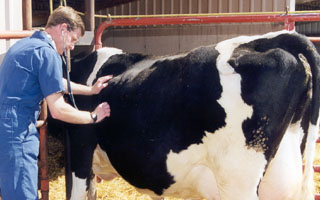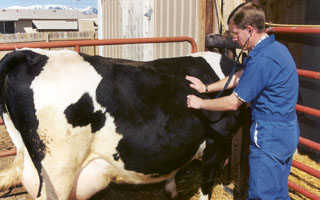
| Listening to the lungs on the left side. |
Introduction:
Pneumonia is one of the most common problems encountered in cattle today. It is a significant cause of decreased productivity and increased treatment costs to the producer. Early diagnosis and proper treatment are critical in controlling this problem.Causative Agents: Most cases of pneumonia are caused by bacteria, virus, and parasite infections. Below are some of the most common causes:
Clinical Signs:
Disease Transmission: Most of these infectious organisms are spread by direct contact with body fluids, manure, or contaminated equipment.
Diagnosis:

|
Figure 1
|

|
Figure 2
|
Treatment:
The treatment for pneumonia depends on whether the cause is bacterial, viral, or parasitic.
- Treatment with antibiotics such as Nuflor, Draxxin, Naxcel, and Excenel are probably the best; however, drugs like Albon, TMS, Ampicillin, Gallimycin and even LA-200 may be considered. Like most bacterial infections, culture and sensitivity is recommended. See the antibiotic information in section G.
- Treatment for all viruses involves treating the symptoms, not killing the virus. With this in mind, fluids, anti-inflammatory agents (Banamine or Re-Covr) and antibiotics for secondary bacterial infections are recommended.
- Most parasites can be treated using ivermectin, moxidectin, or doramectin. Additional suggestions can be found on page A620.
Prevention: Prevention of viral and some bacterial pneumonia revolves around vaccination. See the vaccination schedule and recommendations on page A905. Routine de-worming will help prevent the parasitic causes of pneumonia. If an animal has an infectious cause of pneumonia, it should be isolated from the rest of the herd. Caution should be used to prevent additional spread of the disease by contaminated clothing, hands, buckets, troughs, etc.
* Before initiating any treatment, CONSULT A VETERINARIAN!